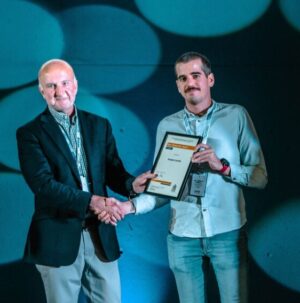Szemináriumok

KTI szeminárium: Héctor Hermida-Rivera - Self-Equivalent Voting Rules
2025.05.22.
Az előadásra hibrid formában kerül sor zoom felületen, illetve személyesen a T.4.23. KTI szemináriumi teremben 2025.05.22-én, 13.00 órától. Előadó: Héctor Hermida-Rivera Cím: Self-Equivalent Voting Rules Absztrakt: In this paper, I introduce a novel stability axiom for stochastic voting rules—called self-equivalence—by which a society considering whether to replace its voting rule using itself will choose not […]

KTI szeminárium: Tóth G. Csaba habilitációs előadása - A népességváltozás mozgatórugói a kelet-közép-európai országokban
2025.05.20.
Az előadásra hibrid formában kerül sor zoom felületen, illetve személyesen a K.0.11-12-es földszinti előadóban 2025.05.20-án, 13.00 órától. Zoom link: https://us06web.zoom.us/j/84668227939?pwd=rMoC7MQoQUVvGjCHoNIEN5al1gdGER.1 Meeting ID: 846 6822 7939Passcode: 075978 Előadó: Tóth G. Csaba (HUN-REN KRTK KTI) Cím: A népességváltozás mozgatórugói a kelet-közép-európai országokban a rendszerváltást követő három évtizedben (habilitációs előadás MAGYAR nyelven) Absztrakt: This study introduces a novel approach […]

KTI szeminárium: Oleg Badunenko - The Global Financial Crisis: Efficiency, Technological innovation, Capital deepening, and Labor mobility
2025.05.15.
Az előadásra hibrid formában kerül sor zoom felületen, illetve személyesen a K.0.11-12-es földszinti előadóban 2025.05.15-én, 13.00 órától. Előadó: Oleg Badunenko Cím: The Global Financial Crisis: Efficiency, Technological innovation, Capital deepening, and Labor mobility Absztrakt: We employ a non-parametric production frontier approach to document the sources of productivity growth in 26 OECD countries. Our analysis utilizes […]

Tudományos kutatási eredmények és gondolatok a fenntartható tájgazdálkodásról, élelmiszertermelésről és elosztásról
2025.05.08.
A HUN-REN Közgazdaság- és Regionális Tudományi Kutatóközpont Regionális Kutatások Intézete Nyugat-magyarországi Tudományos Osztály,a Magyar Regionális Tudományi Társaság Nyugat-dunántúli Tagozata, és a Széchenyi István Egyetem AKMK – Területi Tudományi és Vidékfejlesztési Tanszék szeretettel meghívja “Tudományos kutatási eredmények és gondolatoka fenntartható tájgazdálkodásról, élelmiszertermelésről és elosztásról” című szemináriumára Időpont: 2025. május 8. (csütörtök) 13:00 Helyszín: HUN-REN Közgazdaság- és Regionális Tudományi Kutatóközpont […]

KTI szeminárium: Brüll Eduard - Keeping the Doctor Away: Entry restrictions for General Practioners
2025.05.08.
Az előadásra hibrid formában kerül sor zoom felületen, illetve személyesen a K.0.11-12-es földszinti előadóban 2025.05.08-án, 13.00 órától. Előadó: Brüll Eduard Cím: Keeping the Doctor Away: Entry restrictions for General Practioners Szerzők: Brüll Eduard, Oliver Schlenker and Davud Rostam-Afschar Absztrakt: How does the local supply of general practitioners (GPs) affect the quality and accessibility of healthcare? […]
2025
Szep
16
H
K
Sz
Cs
P
Sz
V
1
2
3
4
5
6
7
8
9
10
11
12
13
14
15
16
17
18
19
20
21
22
23
24
25
26
27
28
29
30
1
2
3
4
5
Hírek

Csurilla Gergely kutatónk döntős lett az EASM New Researcher Award ...
2025.09.12. | 10:04
Tovább olvasom2025.09.12. | 10:04
Tovább olvasom
"Keményen bünteti a munkaerőpiac azokat, akik valamilyen krónikus ...
2025.09.11. | 10:42
Tovább olvasom2025.09.11. | 10:42
Tovább olvasom2025.09.02. | 13:54
Tovább olvasom2025.08.22. | 10:46
Tovább olvasom






